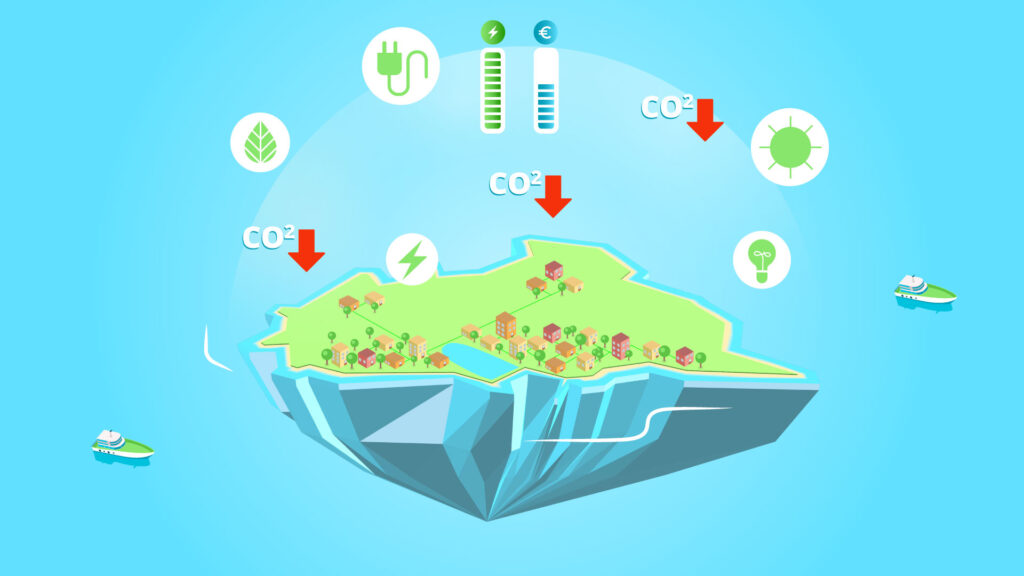Today, islands significantly rely on fossil fuel importation or power interconnections with continental energy suppliers. This dependency is not cost-effective and implies an environmental impact that can no longer be neglected.
To address this issue, the Horizon 2020 Project, REACT, aims to test innovative energy solutions to achieve island energy independence by joining renewable energy systems (RES) with a demand response platform. The project also promotes user engagement in a local energy community.

Apart from the considerable environmental advantage, in terms of the reduction of greenhouse gas (GHG) emission by replacing fossil fuel sources with renewable ones. And the social welfare improvement that comes from creating a sense of community and trust. The overall noticeable benefits will be directly visible by the user when they pay less in their electric bills.
In REACT the users are put at the center of the project as the main actors with the installation of renewable electricity generation technologies on their roofs. As a result, participants will be more than mere consumers, they can become local energy producers that contribute actively to the grid.
They will be able to monitor their energy use and production through innovative systems of metering and user-friendly platforms that increase the awareness of the amount and time of their energy consumptions. And in particular, through the demand response system, the user will be rewarded with financial incentives when shifting its consumption from times of peak demand to times with higher generation and lower demand.
By deciding to use their daily appliances during off-peak periods they will personally benefit from it economically and they will participate in reducing the overall need of the community for a high extra capacity, in improving the grid’s stability, and in securing energy supply in the off-grid system of the islands.
REACT’s Italian Pilot
The REACT project has now come to its third year! At the Italian demo site, the project partner Comune di Carloforte is actively participating in the project activities, piloting the solutions in seven public buildings and setting an example for the local community.
The Municipality has organised several events for citizen engagement and will continue to work with the local community in order to involve as many inhabitants as possible and keep growing the San Pietro sustainable community.
More than 20 dwellings decided to join the project and are offered free consultancy from professionals on how to reduce their energy consumption, the opportunity to test innovative technologies directly at home, and meticulous guidance through the process. This is possible also due to the collaboration of the Italian partners: R2M Solution, Midac, and Mitsubishi Electric Italia.
Mitsubishi Electric Italia provides highly performing heat pump systems that directly results in energy savings, R2M gives support for the overall energy management of the participants’ house and guidance on the potential installation of new renewable energy systems, and Midac supplies energy storage systems to improve the use of the on-site generation and to optimise the demand response curve.
Moreover, participants have complete control and visibility of their consumption through the installation of smart metering monitors.

Renewable Energy Production at San Pietro
Climate Change is a challenge we have to face and San Pietro takes advantage of its optimum meteorological characteristics to reduce its carbon footprint by covering part of its energy demand from renewable energy sources of energy with the large NASCA solar plant and the deployment of punctual photovoltaic panels on the public buildings and participant’s roof.
The energy produced directly on the island is used and shared inside the community. This includes both consumption and local sharing of energy amongst members. The energy is produced by the generating installations within the community. The involvement of more dwellings combined with the spread of RES technologies will increase the on-site production. Thus, boost the island’s self-sufficiency and reduce the dependency on the mainland grid.
Moreover, energy communities also help support local sustainable projects and carbon emission reduction. This contributes to the local economy.
The energy transition involves a social transformation in which civil society and citizens play a crucial role. Citizen participation is essential, it is important that each one of us participates actively and collaboratively for the common goal of the local energy community.
We look forward to reaching more citizens and growing, even more, San Pietro’s energy community! If you are interested in participating or need any clarification, contact us at the following email: info@react2020.eu
We will be pleased to answer any of your questions and learn more about what you think is the right way towards sustainability.